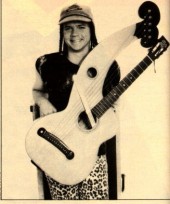Michael Hedges was born in Enid Oklahoma in 1954. Michael Hedges was a conservatory composition major who applied his classically trained musical background in combination with radical innovation to “reinvent” the steel string acoustic guitar. He combined many unusual techniques on the acoustic guitar with a wide range of musical styles, and was also considered an extremely dynamic performer in concert - a “Paganini” of the guitar.
Hedges wrote nearly exclusively in non-standard tunings for the guitar. His emphasis was on using the guitar for composition, not technique, and if a particular musical expression was more easily performed in a certain tuning, he would utilize that to enhance the playability of the composition. Tunings for some of his signature compositions include, from bass to treble: C2C3D3G3A3D4 on "Aerial Boundaries", C2G2D3G3B3C4 on "Rickover's Dream", D2A2D3G3A3D4 for "Ragamuffin", B1A2D3E3A3B3 for "The Rootwitch").
He is known for extensive use in several pieces of two handed tapping techniques (nearly a contrapuntal style of multiple voices). He used the fingers of his right (typically picking) hand to slap harmonic "chords" at the 12th, 7th or 5th fret (or elsewhere). He made use of right hand hammer-ons, particularly on bass notes, and often used the left hand for melodic or rhythmic hammer-ons and pull offs, as well as unusual strummings, that played, as mentioned, independent voices to the right hand. These techniques tended to convert the guitar into a quasi-keyboard like instrument for certain musical purposes. He also made extensive use of string dampening as employed in classical guitar, and was known to insist strongly on the precise duration of sounds and silences in his pieces. Other facets to his playing were percussive slapping on the guitar body and extensive use of artificial harmonics. He also played guitar-variants like the Harp-Guitar (an instrument with additional bass strings that Hedges used to play Bach's Prelude to Cello Suite 1 in G Major in its intended key), and the TransTrem Guitar.
His first albums, Breakfast in the Field and Aerial Boundaries, were milestones for the acoustic guitar, although other instrumentalists were also featured, particularly bassist Michael Manring. He then branched out into songwriting and performing, although he would periodically make a return to more guitar-centred music. Oracle won the 1998 Grammy for Best New Age Album. Hedges was in fact quite a multi-instrumentalist, also playing piano, percussion, tin whistle, harmonica, and flute, among others on his albums.
Many acoustic guitarists claim a very broad range of influences and will not fit into any genre, but this was truer of Hedges than of any other. His musical education was largely in modern 20th century composition. He listened to Leo Kottke, Martin Carthy, John Martyn, and the Beatles, but his approach to composition owed much to Stravinsky, Varèse, Webern, and experimental composers such as Morton Feldman. He saw himself as a composer who played guitar, rather than a guitarist who composed music. He was often categorized as New Age due to his association with the Windham Hill record label. Somewhat in reaction to this, he would describe his music as "Heavy Mental", "New Edge", ""Thrash Acoustic", "Deep Tissue Gladiator Guitar" or "Savage Myth Guitar," amongst other terms.
Hedges was tragically killed in a car accident in 1997. He was 43. His unfinished last recordings were brought to completion in the album Torched, with the help of his friends David Crosby and Graham Nash.
